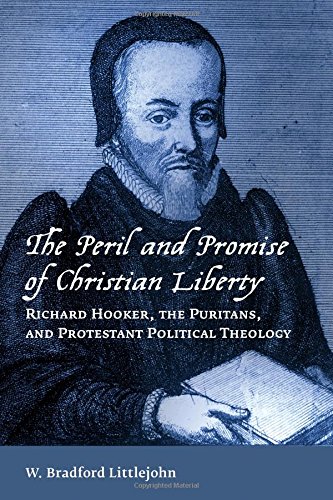Welcome again to Books At a Glance as we continue our brief discussions about the Protestant Reformation. I’m Fred Zaspel, and the English Reformation is our topic today. We are talking to Dr. Bradford Littlejohn, author of The Peril and Promise of Christian Liberty: Richard Hooker, the Puritans, and Protestant Political Theology.
Brad, welcome—good to have you with us!
Brad Littlejohn:
Thanks, Fred, glad to be here.
Fred Zaspel:
Who was Richard Hooker? Can you give us a quick overview of his life and work?
Littlejohn:
Richard Hooker is probably considered the foremost theologian of the English Reformation and even of the Anglican tradition in general. He’s interesting among the great theologians of the period, in England, in that he really never held any particularly high office in the church. Part of that is because he died fairly young. He was born in 1553, right when Bloody Mary had come into the throne and the Reformation looks very much in doubt. Almost his whole life was spent under the reign of Queen Elizabeth, and he dies in 1600, shortly before she does. He died at the age of 46, and at that point he holds a fairly important position in a parish church and is affiliated with Canterbury Cathedral; but he was never a Dean or a Bishop or anything like that. His most important appointment was probably as the master of the Temple church in London between 1585 and 1591. And the Temple was where the lawyers in London practiced and where law students were trained, so it was a position of great influence to be the pastor of that congregation. It was also a very contentious position where Hooker got into a lot of controversy.
He is mostly known, not for his public role, at all, but just for his writings, and really just one book, his Laws of Ecclesiastical Polity, which remained unfinished at his death, but is considered his lasting contribution to the Anglican tradition. He also wrote a number of sermons and shorter writings which are available, which are all very excellent, but he is mainly known for the Laws.
Zaspel:
Tell us about his magnum opus, the Laws of Ecclesiastical Polity: what is it all about, and what motivated him to write it?
Littlejohn:
Well, the Laws is a response to the Puritan challenge during the reign of Elizabeth, and particularly to the Presbyterian movement, and even more particularly, we could say, well, this is the form in which the Presbyterian movement primarily took in England; but the claim that Presbyterianism is iure divino, required by divine law. Though he is not necessarily attacking Presbyterian Church government, as such, even though he does think Episcopacy is better, but he’s particularly concerned with the claim that the Bible requires that, and the Bible forbids Episcopacy. And then, also, associated with that, was a whole bunch of claims about the liturgy, the Book of Common Prayer, and thoughts on specific institutions in the Church of England that were being challenged, not just on the basis that they were unhelpful to the church, though that was often argued, but on the basis that they didn’t have scriptural warrant and therefore were to be thrown out.
What’s fascinating about what Hooker’s doing is there were lots of other polemicists who were arguing against the Puritans on particular points; but what’s significant about Hooker’s work is that he recognized that the key question was not really about church government, about the disputed ceremonies, at all, but was an epistemological question of, “What is the purpose of Scripture, and how does it function in the church and in the Christian life?” And he was very concerned about the emerging line of argument that said, “This is an issue that we need an answer to, therefore, there must be a clear answer in Scripture.” And once you approach Scripture assuming that it is going to give you an answer to whatever pressing question you have, then you’re going to start reading things into Scripture to try to make it produce that answer.
So, the Laws is really an attempt to… And also, sort of related to that, the notion maybe that the Bible gives us such a comprehensive set of law that the only thing we need human authorities for is to put into execution the laws that are already given in Scripture, by the authority of church and state. And he’s saying, no, that’s obviously not the case. We need authorities in church and state to often prudentially devise laws for particular churches in particular societies where Scripture hasn’t given timeless or unambiguous guidance. So, the Laws was an attempt to sort out the function of different authorities in the life of the church and the life of the state. Authorities, both in the sense of epistemological authorities, how do we know truth; and political authorities, how do we know what we’re supposed to do, right here and now.
Zaspel:
What are some ways in which Hooker has been and perhaps continues to be misunderstood?
Littlejohn:
I think Hooker is misunderstood partly because of, well, he’s obviously an opponent of the Puritans, or at least in this particular strongly Biblicist strand of Puritanism. And there’s been kind of a historiography among Presbyterians since, that those figures represent the reformed tradition in England; and therefore, everyone who opposed them was not reformed; but was quasi-Popish, which was, of course, what some of these guys were saying at the time. And that has actually been reinforced a bit by – I think there’s been a shift in Anglican self-understanding, particularly since the Oxford Movement in the 19th century, though you can find some of it before hand. A shift in Anglican self-understanding, such that the Anglican tradition defines itself as not reformed. They’re happy without the reformed label – Puritans can have that reformed label, we don’t want it. But that’s not how it was understood at the time. Both sides saw themselves as theologically reformed, as in fellowship with the reformed churches on the continent. I think people like Hooker were considerably more willing to disagree with Calvin on various points, whereas his opponents were, sort of like, Calvin’s a be-all and end-all. But it was a disagreement within a still broad and evolving reformed tradition. And I think Hooker’s often misunderstood by attempting to pigeonhole him as an Anglican thinker who is over and against the reformed tradition. Which means that people tried to read lots of later high church, Anglican or even Anglo-Catholic positions into him, and they’re not really there.
Another, I think, important misunderstanding is his use of the word reason. He’s talking about the relationship of reason in Scripture; and post-Enlightenment, we kind of think of, okay, whoa, that just sends all kinds of alarm bells, right? I think reason is this independent authority over against Scripture, this kind of autonomous source of knowledge by which we claim an equal authority to God. And Hooker is not using the word in that kind of Enlightenment sense, at all. He’s thinking, “Look, God reveals (actually it’s standard, reformed Protestant language) God reveals himself in Scripture, and God reveals himself in nature and we’re supposed to learn from both sources of Revelation. And reason is just – he’s given us intellectual faculties. He speaks to us through the word of Scripture, and by speaking to us through words we have to interpret words using our intellectual faculties and so how do those faculties work? Scripture is not self-interpreting. It requires a thoughtful reader and interpreter. So, when he’s talking about the relationship of reason in Scripture, it’s not two independent sources of knowledge in that Enlightenment sense. And I think that’s important to keep in mind.
Zaspel:
Tell us a bit about your own work on Richard Hooker—past, present, and future.
Littlejohn:
I started working on Hooker in 2010 – 2011, as I was doing my doctoral work at the University of Edinburgh, and that project I finished in late 2013, at least the dissertation. I have tweaked and revised and expanded, and that’s going to be coming out in just a week or two as The Peril and Promise of Christian Liberty, which you mentioned earlier, from Eerdmans. And that’s really an attempt to situate Hooker’s work within a much broader Reformation discussion of the meaning of Christian liberty in relation to human authority. What does freedom of conscience mean; and what does it not mean? For the reformers, it was a very important thing, the freedom of the conscience, but it didn’t mean the modern sense that nobody can tell you what to believe or what to do, every man for himself. So how does that work? And relating that to modern debates in political theology about the role of faith in politics.
So, there’s that project. While I was working on the revision of that, I also put together a short accessible guide just to introduce someone who doesn’t know much about Hooker to his importance and his thought. And that was for a series called the Cascade Companions that came out about a year and a half ago: Richard Hooker: A Companion to His Life and Work.
But the project that I’m most excited about is… You know, Hooker’s Laws is amazing; the problem is it’s written in 16th century English. And not just any 16th century English – Hooker’s own contemporaries were, like, this is really difficult stuff. I mean literary scholars are, like, this is amazing; it’s some of the most powerful literature in the genre of theology, but it’s difficult. It’s like Spencer was difficult; and lot of these Elizabethan writers. So, people find it really easy to read Calvin because they’re not reading Calvin in French or Latin, they’re reading Calvin in a 20th century English translation. Ironically, these figures who wrote in English are now almost inaccessible to us; whereas, figures who wrote in French or Latin or German are accessible because they been translated. So, we’ve got this project going to actually translate Hooker into modern English; and really approach it just as you would approach translating a foreign language work. We have one volume of that already out, and another volume coming out next month.
Zaspel:
We’re talking to Brad Littlejohn about Richard Hooker and the English Reformation. Dr. Littlejohn is the author of several books on Richard Hooker that you’ll want to check out here on this page of our site.
Brad, thanks for talking to us today.
Littlejohn:
Thank you very much, Fred.
Editor’s Note: Here are some works by Brad Littlejohn that you may want to check out:
Richard Hooker: A Companion to His Life and Work
Amazon hardcover, paperback, and Kindle
Radicalism: When Reform Becomes Revolution: The Preface to Hooker’s Laws: A Modernization
Amazon paperback and Kindle
The Peril and Promise of Christian Liberty: Richard Hooker, the Puritans, and Protestant Political Theology
Amazon paperback
Buy the books

The Peril and Promise of Christian Liberty: Richard Hooker, the Puritans, and Protestant Political Theology
